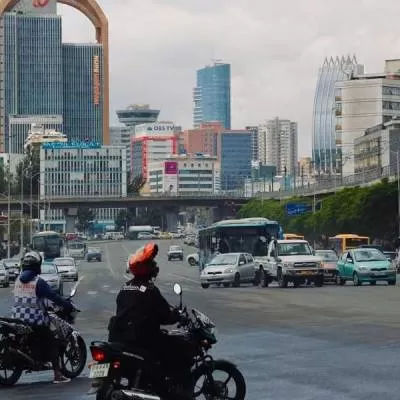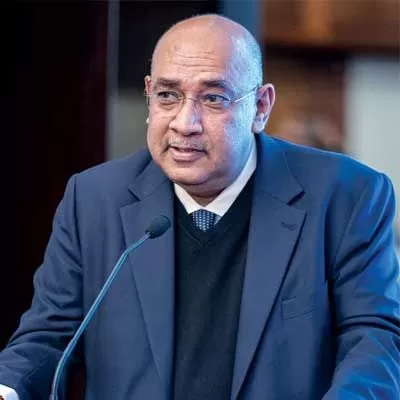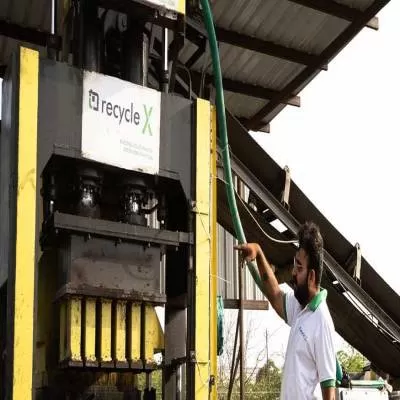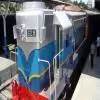- Home
- Infrastructure Urban
- ECONOMY & POLICY
- Reinventing for Growth
Reinventing for Growth
Economic crisis over the last several years has proved that to sustain for a longer period, companies should reinvent at regular intervals. Reinvention for a company is possible only through innovation which is critical for running the business. The significance of innovation is more for developing economies as they tend to rely more on other countries for their demand, which makes them highly vulnerable to global crisis like the current scenario.
Fast movers: History has proved that countries with a higher number of innovative companies tend to grow fastest and have a sustainable growth. During challenging times like the ongoing crisis, innovation is the only criteria that can help a company and economy to survive and remain growth-oriented. For developing economies to consistently grow at a higher rate, innovation in infrastructure is a pre-requisite. There is a tendency to consider sectors like power, roads, railways, ports, civil aviation and telecom when it comes to the country´s infrastructure. Although these sectors are the backbone for any economy, the country´s growth also depends on the development of social infrastructure, which includes education, healthcare, housing, sanitation (including waste management), hospitality and culture. All these sectors are collectively part of the urban infrastructure and innovation in urban infrastructure is a bottom-up approach to inclusive growth. It considers availability of basic necessities first and then goes up the ladder for developing other infrastructure, which also assists business growth.
Wanting areas: The need for innovation in urban infrastructure has been felt due to the increasing focus on global warming. In the last few years, innovations like sustainable buildings, green construction and infrastructure facilities that lead to energy conservation have been in demand as it reduces long-term cost by conserving the environment.
According to Mckinsey and Company´s finding in October 2012, most infrastructure leaders agreed that innovation is not just an introduction of technologies, but ´new ways of doing things´ when providing service and conducting day-to-day operations for their organisations. This is true to businesses across sectors. It is difficult to develop ´integrated systems´ like access control, video surveillance, data network, voice network, video distribution, audio visual systems and facility management systems on a common technology platform using cloud model.
Also it is important to manage the needs of citizens through the smart ICT platform to deliver services on time and at a lower cost as compared to other business district. Further, it is critical to integrate the global stock exchanges using financial extranet services and bring them on the same platform where enterprises will have access to real time data from anywhere and anytime.
GIFT Smart ICT: Government of Gujarat through its public sector undertaking, Gujarat Urban Development Company Ltd (GUDCL) and Infrastructure Leasing and Financial Services Ltd (IL and FS), formed a JV company in the name of Gujarat International Finance Tec-City Company Ltd (GIFTCL) for the development of a global financial hub named Gujarat International Finance Tec-City (GIFT) in Gandhinagar.
GIFT is a first-of-its-kind global financial and IT services hub in India. It is a globally benchmarked International Finance Centre (IFC) to be developed in SEZ and Domestic Finance Centre (DFC). It is supported by state-of-the-art internal infrastructure encompassing all basic urban infrastructure elements along with an excellent external connectivity.
On completion, GIFT also envisages to become a hub for financial services, IT or ITeS, and other multi-services sector. This project has the potential to generate around 0.5 million direct jobs and an equal number of indirect jobs. While integrating best features, the project will set standards for a sustainable business environment.
Vision and objectives: The vision of GIFT is to ´Create leading-edge infrastructure, services and platforms and offer financial and services sector enterprises a significant competitive advantage to operate regionally and globally´. The objectives of the project includes establishing a world class information and communication technology environment to serve the needs of the country, region and world. It also aims at providing a technologically advanced financial services gateway to national and international financial markets and platforms. The other objectives include providing a tangible competitive advantage for the customers; creating an ´integrated city´ blueprint for all and being recognised as environmentally ´green´.
GIFT ICT solution services : GIFT ICT provides seamless ICT outsourcing solutions, which allow customers to focus on their core business as well as lower IT and communication and costs. It offers an integrated strategy to deliver a number of critical components. The core services is the foundation to the whole operation. It includes core networks to be built and managed by the GIFT ICT; metro and in-building fibre;Fibre To The Premise (FTTP); data centre civil and base power infrastructure; Server Farms, Telecom Hotel, Internet Xchange and Interconnect Xchange and Extranet gateway.
Further, a certified Tier IV Data Centre with 900 racks including 75 racks for managed hosting will serve customers nationally, regionally and globally. The data centre services include compliance to international standards; 24 x 7 three level security system equipped with electronic and physical security and biometric, palm readers or thumb readers; greenest energy savings; and physical infrastructure like power where dual grid and standby source withstands an outage of 96 hours cooling localised for saving energy racks and physical structure.
Smart living, smart working: The Integrated Building System (IBS) helps reduce total cap ital and operating costs. Also, Building Automation Systems (BAS) improve efficiency and real-time control over the building´s life time operating costs. The ´Green´ movement is captured to reduce carbon emissions in the HVAC control system, lighting control, lifts, power management and water efficiency management.
About the author:
Ramakant Jha, Managing Director, Gujarat International Finance Tec-City Co Ltd (GIFT), has over 44 years of professional experience. His areas of expertise include planning, design, project development, execution (including financing), research and development of large projects covering town planning, transportation planning, detailed planning and design of integrated urban infrastructure as well as project execution.
It is important to manage the needs of citizens through the smart ICT platform, avers RAMAKANT JHA. Economic crisis over the last several years has proved that to sustain for a longer period, companies should reinvent at regular intervals. Reinvention for a company is possible only through innovation which is critical for running the business. The significance of innovation is more for developing economies as they tend to rely more on other countries for their demand, which makes them highly vulnerable to global crisis like the current scenario. Fast movers: History has proved that countries with a higher number of innovative companies tend to grow fastest and have a sustainable growth. During challenging times like the ongoing crisis, innovation is the only criteria that can help a company and economy to survive and remain growth-oriented. For developing economies to consistently grow at a higher rate, innovation in infrastructure is a pre-requisite. There is a tendency to consider sectors like power, roads, railways, ports, civil aviation and telecom when it comes to the country´s infrastructure. Although these sectors are the backbone for any economy, the country´s growth also depends on the development of social infrastructure, which includes education, healthcare, housing, sanitation (including waste management), hospitality and culture. All these sectors are collectively part of the urban infrastructure and innovation in urban infrastructure is a bottom-up approach to inclusive growth. It considers availability of basic necessities first and then goes up the ladder for developing other infrastructure, which also assists business growth. Wanting areas: The need for innovation in urban infrastructure has been felt due to the increasing focus on global warming. In the last few years, innovations like sustainable buildings, green construction and infrastructure facilities that lead to energy conservation have been in demand as it reduces long-term cost by conserving the environment. According to Mckinsey and Company´s finding in October 2012, most infrastructure leaders agreed that innovation is not just an introduction of technologies, but ´new ways of doing things´ when providing service and conducting day-to-day operations for their organisations. This is true to businesses across sectors. It is difficult to develop ´integrated systems´ like access control, video surveillance, data network, voice network, video distribution, audio visual systems and facility management systems on a common technology platform using cloud model. Also it is important to manage the needs of citizens through the smart ICT platform to deliver services on time and at a lower cost as compared to other business district. Further, it is critical to integrate the global stock exchanges using financial extranet services and bring them on the same platform where enterprises will have access to real time data from anywhere and anytime. GIFT Smart ICT: Government of Gujarat through its public sector undertaking, Gujarat Urban Development Company Ltd (GUDCL) and Infrastructure Leasing and Financial Services Ltd (IL and FS), formed a JV company in the name of Gujarat International Finance Tec-City Company Ltd (GIFTCL) for the development of a global financial hub named Gujarat International Finance Tec-City (GIFT) in Gandhinagar. GIFT is a first-of-its-kind global financial and IT services hub in India. It is a globally benchmarked International Finance Centre (IFC) to be developed in SEZ and Domestic Finance Centre (DFC). It is supported by state-of-the-art internal infrastructure encompassing all basic urban infrastructure elements along with an excellent external connectivity. On completion, GIFT also envisages to become a hub for financial services, IT or ITeS, and other multi-services sector. This project has the potential to generate around 0.5 million direct jobs and an equal number of indirect jobs. While integrating best features, the project will set standards for a sustainable business environment. Vision and objectives: The vision of GIFT is to ´Create leading-edge infrastructure, services and platforms and offer financial and services sector enterprises a significant competitive advantage to operate regionally and globally´. The objectives of the project includes establishing a world class information and communication technology environment to serve the needs of the country, region and world. It also aims at providing a technologically advanced financial services gateway to national and international financial markets and platforms. The other objectives include providing a tangible competitive advantage for the customers; creating an ´integrated city´ blueprint for all and being recognised as environmentally ´green´. GIFT ICT solution services : GIFT ICT provides seamless ICT outsourcing solutions, which allow customers to focus on their core business as well as lower IT and communication and costs. It offers an integrated strategy to deliver a number of critical components. The core services is the foundation to the whole operation. It includes core networks to be built and managed by the GIFT ICT; metro and in-building fibre;Fibre To The Premise (FTTP); data centre civil and base power infrastructure; Server Farms, Telecom Hotel, Internet Xchange and Interconnect Xchange and Extranet gateway. Further, a certified Tier IV Data Centre with 900 racks including 75 racks for managed hosting will serve customers nationally, regionally and globally. The data centre services include compliance to international standards; 24 x 7 three level security system equipped with electronic and physical security and biometric, palm readers or thumb readers; greenest energy savings; and physical infrastructure like power where dual grid and standby source withstands an outage of 96 hours cooling localised for saving energy racks and physical structure. Smart living, smart working: The Integrated Building System (IBS) helps reduce total cap ital and operating costs. Also, Building Automation Systems (BAS) improve efficiency and real-time control over the building´s life time operating costs. The ´Green´ movement is captured to reduce carbon emissions in the HVAC control system, lighting control, lifts, power management and water efficiency management. About the author: Ramakant Jha, Managing Director, Gujarat International Finance Tec-City Co Ltd (GIFT), has over 44 years of professional experience. His areas of expertise include planning, design, project development, execution (including financing), research and development of large projects covering town planning, transportation planning, detailed planning and design of integrated urban infrastructure as well as project execution.




















